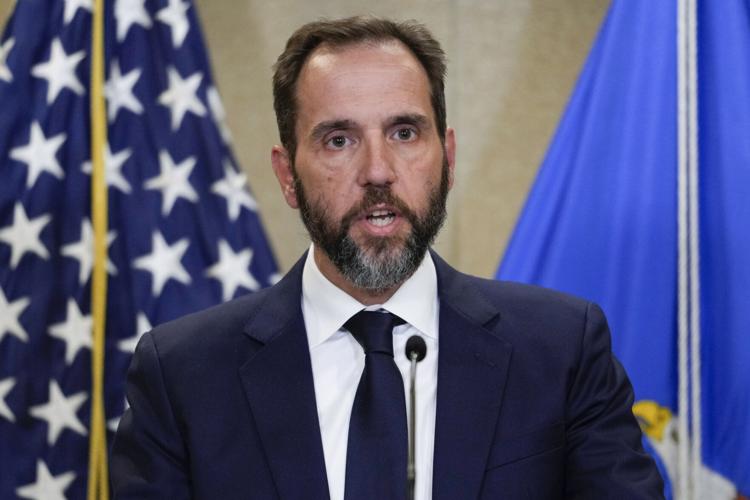PHOENIX — Attorney General Kris Mayes wants to know everything the federal special counsel found out about interference by Donald Trump and his allies in the peaceful transition of power after the 2020 election he lost.
The reason: To help her with her own case against Trump allies involved in a scheme to send a slate of fake electors from Arizona to Congress.

Mayes
In a letter Monday, Mayes reminded U.S. Attorney General Merrick Garland that she had sought access to the work of Jack Smith nearly two years ago. At that time, Mayes said, the special counsel “was not ready or able to share any materials.’’
Since then, Smith has folded his investigation after concluding voters’ decision to return Trump to the White House makes any move to prosecute him impossible. A Department of Justice policy prohibits the federal prosecution of sitting presidents.
Garland plans to release only Smith’s report — but not other materials he gathered.
That, Mayes wrote to Garland, changes everything.

Special counsel Jack Smith
Last year a state grand jury indicted the fake electors who claimed Trump won the 2020 race in Arizona and was entitled to the state’s 11 electoral votes, along with seven other defendants who were Trump lawyers and supporters. Those include attorney Rudy Giuliani and former Trump chief of staff Mark Meadows.
Trump himself was listed as an “unindicted co-conspirator.’’
The case is set for trial a year from now. Mayes thinks that what Smith uncovered will help, especially now that he isn’t pursuing his own case.
“Today, my office has one of the only remaining cases that includes charges against national actors,’’ she told Garland. “Undoubtedly, disclosing special counsel’s file to my office will help ensure that those who should be held accountable are.’’
But Mayes assured Garland she’s not just looking for evidence to help convict those indicted.
“I am also Arizona’s chief law enforcement officer and a minister of justice,’’ she wrote. “I must be sure the rights of defendants are protected as well, and I would welcome any exculpatory material that the special counsel possesses.’’
Anyway, Mayes said, it appears from “media reports’’ that Smith already made “substantial disclosures’’ to some of those he had targeted — the same people who are in the state indictment.
All this comes amid a legal fight playing out in federal courts about whether Smith’s report will be made public. A federal appeals court last week rejected a bid to keep secret the documents, which are anticipated to detail Trump’s efforts to not give up the White House after his 2020 loss as well as any role in the Jan. 6, 2021 riot at the Capitol that sought to thwart the counting of the electoral votes.
Mayes said whatever is occurring on that legal front is irrelevant to her request. She told Garland that a federal rule of criminal procedures “gives you the authority to disclose grand jury information for use in Arizona’s criminal case.’’
There was no immediate response from Garland’s office.
Trump lost Arizona by 10,457 votes in 2020. Several legal challenges to the results were dismissed, including one filed by Kelli Ward, then chair of the Arizona Republican Party,
At that point Ward and 10 others came together to sign a document declaring Trump had won Arizona and they were the rightful electors whose votes should be counted. They then submitted that to Congress.
The indictment says that plan was hatched by Trump allies, with Trump himself involved. The goal was to prevent Joe Biden from getting the necessary 270 electoral votes.
If nothing else, the dispute over electors was designed to allow Mike Pence, then vice president and, as such, president of the Senate, to refuse to certify the results on Jan. 6. Pence refused and Biden’s election was confirmed.
Jenna Ellis, one of Trump’s attorneys, already agreed to cooperate in prosecution of the remaining Arizona defendants in exchange for eventually having all charges against her dismissed.
Ellis promised to not only give interviews to investigators from the state Attorney General’s Office but also to testify wherever they want, including at any future grand jury proceedings and any civil or criminal trials. She also agreed to turn over any documents she has related to the probe.
Ellis played a key role in arguing in Arizona and elsewhere that there was fraud in the 2020 race and that Trump should have been elected.
She specifically worked with Giuliani to convince lawmakers in Arizona to move to overturn the election results. Those efforts included meeting with then-House Speaker Rusty Bowers, a Mesa Republican, who refused to call a special legislative hearing where Trump supporters wanted to present what they claimed was evidence Biden lost the race.
Kenneth Chesebro, who was a legal adviser to the Trump campaign, had met with investigators in Arizona even before the indictment was issued in April. He was not among those charged. Mayes already put him on a list of witnesses she intends to call when the case goes to trial.
Separately, Lorraine Pellegrino, the founder and former president of Ahwatukee Republican Women, pleaded guilty to a misdemeanor charge of filing a false instrument and was placed on unsupervised probation with community service.
Get your morning recap of today's local news and read the full stories here: tucne.ws/morning





